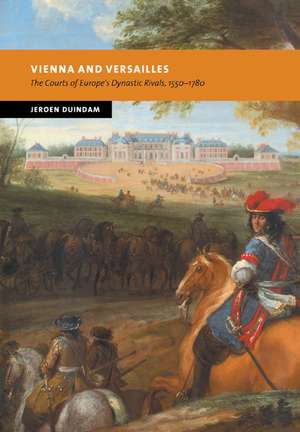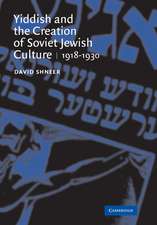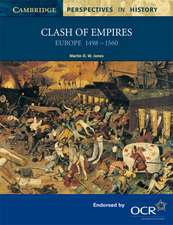Vienna and Versailles: The Courts of Europe's Dynastic Rivals, 1550–1780: New Studies in European History
Autor Jeroen Duindamen Limba Engleză Paperback – 26 aug 2007
Din seria New Studies in European History
-
 Preț: 177.91 lei
Preț: 177.91 lei -
 Preț: 238.02 lei
Preț: 238.02 lei -
 Preț: 208.50 lei
Preț: 208.50 lei -
 Preț: 398.42 lei
Preț: 398.42 lei -
 Preț: 237.92 lei
Preț: 237.92 lei - 9%
 Preț: 593.91 lei
Preț: 593.91 lei -
 Preț: 180.06 lei
Preț: 180.06 lei - 9%
 Preț: 592.61 lei
Preț: 592.61 lei -
 Preț: 169.70 lei
Preț: 169.70 lei -
 Preț: 211.13 lei
Preț: 211.13 lei -
 Preț: 166.99 lei
Preț: 166.99 lei -
 Preț: 266.53 lei
Preț: 266.53 lei -
 Preț: 241.90 lei
Preț: 241.90 lei -
 Preț: 429.99 lei
Preț: 429.99 lei -
 Preț: 400.05 lei
Preț: 400.05 lei - 11%
 Preț: 698.50 lei
Preț: 698.50 lei -
 Preț: 275.85 lei
Preț: 275.85 lei -
 Preț: 330.09 lei
Preț: 330.09 lei - 11%
 Preț: 695.93 lei
Preț: 695.93 lei -
 Preț: 423.10 lei
Preț: 423.10 lei -
 Preț: 340.13 lei
Preț: 340.13 lei - 11%
 Preț: 698.30 lei
Preț: 698.30 lei -
 Preț: 326.82 lei
Preț: 326.82 lei -
 Preț: 339.37 lei
Preț: 339.37 lei -
 Preț: 396.59 lei
Preț: 396.59 lei -
 Preț: 383.48 lei
Preț: 383.48 lei -
 Preț: 292.40 lei
Preț: 292.40 lei - 14%
 Preț: 682.94 lei
Preț: 682.94 lei -
 Preț: 282.75 lei
Preț: 282.75 lei -
 Preț: 417.07 lei
Preț: 417.07 lei -
 Preț: 437.18 lei
Preț: 437.18 lei - 14%
 Preț: 873.67 lei
Preț: 873.67 lei -
 Preț: 319.99 lei
Preț: 319.99 lei - 14%
 Preț: 687.39 lei
Preț: 687.39 lei -
 Preț: 397.01 lei
Preț: 397.01 lei - 11%
 Preț: 695.93 lei
Preț: 695.93 lei - 11%
 Preț: 543.84 lei
Preț: 543.84 lei
Preț: 420.40 lei
Nou
Puncte Express: 631
Preț estimativ în valută:
80.45€ • 87.36$ • 67.58£
80.45€ • 87.36$ • 67.58£
Carte tipărită la comandă
Livrare economică 23 aprilie-07 mai
Preluare comenzi: 021 569.72.76
Specificații
ISBN-13: 9780521714761
ISBN-10: 0521714761
Pagini: 392
Ilustrații: 41 b/w illus. 11 tables
Dimensiuni: 169 x 243 x 18 mm
Greutate: 0.62 kg
Ediția:1
Editura: Cambridge University Press
Colecția Cambridge University Press
Seria New Studies in European History
Locul publicării:Cambridge, United Kingdom
ISBN-10: 0521714761
Pagini: 392
Ilustrații: 41 b/w illus. 11 tables
Dimensiuni: 169 x 243 x 18 mm
Greutate: 0.62 kg
Ediția:1
Editura: Cambridge University Press
Colecția Cambridge University Press
Seria New Studies in European History
Locul publicării:Cambridge, United Kingdom
Cuprins
List of illustrations; List of tables; Acknowledgements; Abbreviations; Part I. Prelude: 1. Introduction; 2. The household on the eve of the early modern age; Part II. Contours: 3. Numbers and costs; 4. Status and income; Part III. Court Life: 5. A calendar of court life; 6. Ceremony and order at court: an unending pursuit; Part IV. Power: 7. Levels and forms of power at court; 8. The court as focus of the realm; Part V. Epilogue: 9. Conclusions and conjectures; Manuscript sources; Printed sources; Bibliography; Index.
Recenzii
'This is a radical interpretation of the power of the two courts, and it gives us some fascinating insights into the nature of early modern rule.' H-France
'A skilful and well-documented account of court life … Duindam is to be congratulated on an important work.' History
'… a major contribution to the history of each court and the associated governments as well as to comparative history.' The American Historical Review
'What was needed if we were to understand what courts were really about was a solid empirical base derived from the widest possible range of original sources … [the author] has produced it; and the result will change court studies profoundly … For that of Vienna, this book is a new starting point. For that of Versailles, it is much more a turning point. Saint-Simon's spell has at last been broken.' William Doyle, University of Bristol
'A skilful and well-documented account of court life, which draws on very extensive research … There are valuable sections on numbers and costs, status and income, and on the calendar of court life; and contrasts between the two courts help underline what was specific to each … Duindam is to be congratulated on an important work …' The Historical Association and Blackwell Publishing Ltd
'… an up-to-date and detailed comparison … Duindam paints a fascinating portrait of court life in the late-seventeenth and early-eighteenth centuries …' H-Net Review
'… no future scholar of Vienna or Versailles will be able to ignore his carefully researched book. Comparatists are well advised to study it closely. This publication - like that of Elias before him - will provide the impetus for much new scholarship in the historiography of the early modern European court.' H-Net Review
'Duindam offers a fascinating discussion of the calendar of court life and of the role of ceremony and its attendant ritual. … by having offered such a comprehensive and informed guide to life at two of the most important European courts. Duindam has performed a real service. His work will be the essential starting point for all scholars of the court and it will have much to offer students of the early modern period in general.' European History Quarterly
'It is the fruit of many years of painstaking work in French and Austrian archives, strongly supported by an impressive quality of printed evidence and secondary material. The subject is both excellent and timely.' German History
'… ambitious … The author is to be congratulated for a first book that represents a tour de force of scholarship across two centuries of documents …' Australian History Yearbook
'… Jeroen Duindam's Vienna and Versailles certainly deserves pride of place … it will provide a point of reference for years to come. An immense amount of source material from Austrian and French archives as well as contemporary memoirs has been digested, resulting in a book so rich in detail that, at first glance, it indeed seems to be mainly descriptive. Read more carefully, however, it quickly becomes clear that important discussions of the current state of thinking on princely households are embedded in this wealth of information. They yield important insights into the working of the early modern court and refute many rash conclusions which have found their way into secondary literature … Duindam is very successful in rewriting important aspects of the cultural and social history of the early modern court … Duindam conveys the ambiguities of life at court, the uncertainties about ceremonial rules, salaries, and ranks, and the constant quarrels and disputes which must have made the existence of a courtier far from agreeable. He also lays bare the difficulties of dealing with the surviving evidence. Vienna and Versailles is therefore a timely reminder in the current vogue for court studies that our knowledge of royal households is more limited and the reality of court life more complex than we often concede.' German Historical Institute Bulletin
'A skilful and well-documented account of court life … Duindam is to be congratulated on an important work.' History
'… a major contribution to the history of each court and the associated governments as well as to comparative history.' The American Historical Review
'What was needed if we were to understand what courts were really about was a solid empirical base derived from the widest possible range of original sources … [the author] has produced it; and the result will change court studies profoundly … For that of Vienna, this book is a new starting point. For that of Versailles, it is much more a turning point. Saint-Simon's spell has at last been broken.' William Doyle, University of Bristol
'A skilful and well-documented account of court life, which draws on very extensive research … There are valuable sections on numbers and costs, status and income, and on the calendar of court life; and contrasts between the two courts help underline what was specific to each … Duindam is to be congratulated on an important work …' The Historical Association and Blackwell Publishing Ltd
'… an up-to-date and detailed comparison … Duindam paints a fascinating portrait of court life in the late-seventeenth and early-eighteenth centuries …' H-Net Review
'… no future scholar of Vienna or Versailles will be able to ignore his carefully researched book. Comparatists are well advised to study it closely. This publication - like that of Elias before him - will provide the impetus for much new scholarship in the historiography of the early modern European court.' H-Net Review
'Duindam offers a fascinating discussion of the calendar of court life and of the role of ceremony and its attendant ritual. … by having offered such a comprehensive and informed guide to life at two of the most important European courts. Duindam has performed a real service. His work will be the essential starting point for all scholars of the court and it will have much to offer students of the early modern period in general.' European History Quarterly
'It is the fruit of many years of painstaking work in French and Austrian archives, strongly supported by an impressive quality of printed evidence and secondary material. The subject is both excellent and timely.' German History
'… ambitious … The author is to be congratulated for a first book that represents a tour de force of scholarship across two centuries of documents …' Australian History Yearbook
'… Jeroen Duindam's Vienna and Versailles certainly deserves pride of place … it will provide a point of reference for years to come. An immense amount of source material from Austrian and French archives as well as contemporary memoirs has been digested, resulting in a book so rich in detail that, at first glance, it indeed seems to be mainly descriptive. Read more carefully, however, it quickly becomes clear that important discussions of the current state of thinking on princely households are embedded in this wealth of information. They yield important insights into the working of the early modern court and refute many rash conclusions which have found their way into secondary literature … Duindam is very successful in rewriting important aspects of the cultural and social history of the early modern court … Duindam conveys the ambiguities of life at court, the uncertainties about ceremonial rules, salaries, and ranks, and the constant quarrels and disputes which must have made the existence of a courtier far from agreeable. He also lays bare the difficulties of dealing with the surviving evidence. Vienna and Versailles is therefore a timely reminder in the current vogue for court studies that our knowledge of royal households is more limited and the reality of court life more complex than we often concede.' German Historical Institute Bulletin
Notă biografică
Descriere
A comparative study of the courts of Vienna and Paris-Versailles, 1550–1780.












